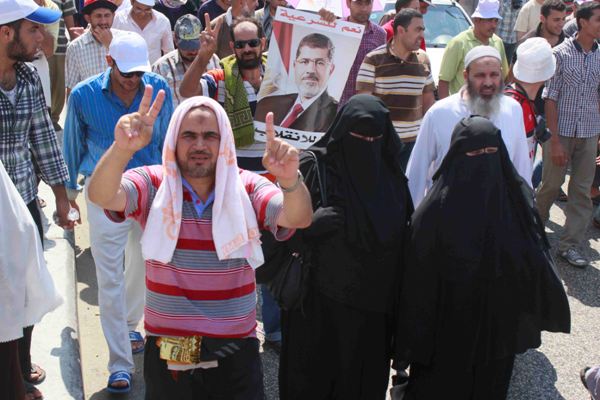Latest NEWS
- Aswat Masriya, the last word
- Roundup of Egypt's press headlines on March 15, 2017
- Roundup of Egypt's press headlines on March 14, 2017
- Former Egyptian President Hosni Mubarak to be released: lawyer
- Roundup of Egypt's press headlines on March 13, 2017
- Egypt's capital set to grow by half a million in 2017
- Egypt's wheat reserves to double with start of harvest -supply min
- Roundup of Egypt's press headlines on March 12, 2017
UPDATE: Mursi backers call for marches to foil Egypt crackdown

A march staged by supporters of deposed President Mohamed Mursi on Sunday, August 4, 2013 - Emad Ahmed/Aswat Masriya
By Yasmine Saleh
CAIRO, Aug 12 (Reuters) - Supporters of deposed President Mohamed Mursi urged Egyptians to take to the streets on Monday to thwart any police crackdown on two Cairo protest camps that thousands of Islamists have manned for weeks.
Security sources and a government official had said police action to close the camps would begin at dawn, despite the risk of a violent clashes with those seeking Mursi's reinstatement, but nothing transpired, and the demonstrators vowed to stay put.
A pro-Mursi grouping, which includes the Muslim Brotherhood, called for nationwide rallies against the military, which toppled Egypt's first freely elected leader on July 3.
"The alliance calls on the people of Egypt in all provinces to go out on marches on Monday and gather everywhere," it said in a statement that also proclaimed plans for "a million-man march" on Tuesday against what it called a military coup.
At al-Nahda camp, centred round a traffic circle and extending down a palm tree-lined boulevard next to Cairo zoo, protesters lolled in the shade of tents away from the mid-afternoon sun. The mood was solemn, but not fearful.
Asked about the threat to dismantle the camps, Ahmed Shargawy, a 23-year-old translator, said: "They said that 15 days ago too. They always say they are going to finish it."
After a six-week-old standoff, the authorities are keen to remove the sit-ins, where women and children are among the protesters, and accuse Brotherhood leaders of inciting violence.
Western and Arab envoys and some senior Egyptian government members have pressed the army to avoid using force as it tries to end the crisis in the troubled Arab nation of 84 million.
Foreign Minister Nabil Fahmy said the right to peaceful protest would be guaranteed and that every effort was being made to resolve the situation through dialogue, but he suggested there was a limit to the government's patience.
"It is not reasonable for any democratic government to have to accept sit-ins where violence is being used and the security of citizens and the country is being threatened," state news agency MENA quoted Fahmy as saying in an interview with the BBC.
One security official said the protesters would be removed gradually. At first, warnings would be issued and people would be asked to leave. Police would then use water cannons and tear gas to disperse those who refused to budge.
Another security official said: "Violence will not be used unless the protesters get violent."
Mursi's defiant supporters have fortified the protest camps with sandbags and piles of rocks in anticipation of a crackdown.
Thousands were still camped out at the biggest sit-in, near a mosque in northeast Cairo. At entrances to the sprawling site, men with sticks shouted "God is greatest" to keep morale high.
"RELIGION, NOT POLITICS"
"I have been here for 28 days and will stay until I die as the issue is now about religion not politics. We want Islam, they want liberalism," said protester Ahmed Ramadan, who quit his job in a Red sea tourist resort to join the camp.
One security source said action against the protesters had been delayed because larger crowds had arrived at the protest camps after news broke that a crackdown was imminent.
Army chief General Abdel Fattah al-Sisi, who ousted Mursi, has come under pressure from hardline military officers to break up the Brotherhood sit-ins, security sources say.
Almost 300 people have been killed in political violence since Mursi's overthrow, including dozens of his supporters shot dead by security forces in two incidents.
Egypt has been convulsed by political and economic turmoil since the 2011 uprising that ended 30 years of autocratic rule by U.S.-backed President Hosni Mubarak, and the most populous Arab nation is now more polarised than any time for many years.
There is deepening alarm in the West over the course taken by Egypt, which sits astride the Suez Canal and receives $1.5 billion a year in mainly military aid from the United States.
Mursi became president in June 2012. But concerns he was seeking an Islamist autocracy and his failure to ease economic hardships led to mass rallies prompting the army to oust him.
Since then Brotherhood leaders have been jailed. Mursi is detained in an unknown location. (Additional reporting by Shadia Nasralla; Writing by Michael Georgy; Editing by Alistair Lyon)










